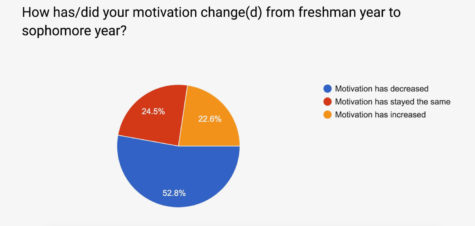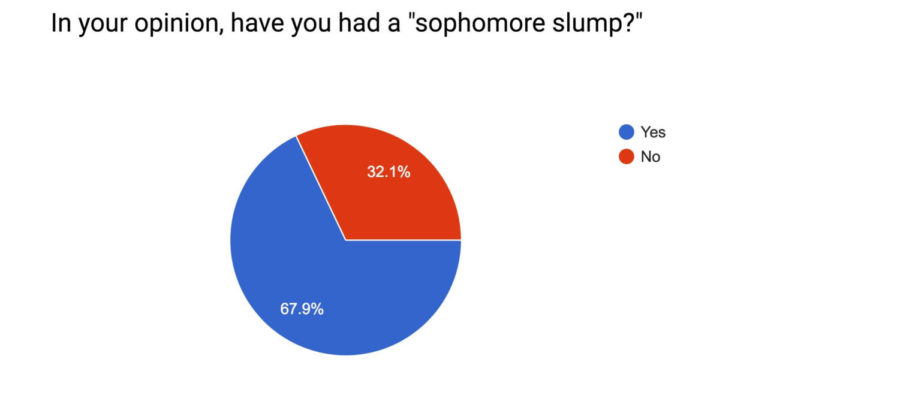Sophomore slump proves prevalent among students, barely recognized by faculty
The sophomore slump represents a troublesome phenomenon among tenth graders at Urban; it can be easy to identify in oneself, yet difficult to see as a trend in the greater community. Within the walls of Urban, students’ and teachers’ perspectives on this infamous slump vary and contradict each other.
A recent poll with a 12.6% margin of error sent to a group of sophomores, juniors, and seniors at Urban reports that nearly 68% of students experience a sophomore slump. Additionally, 52% of students experience decreased academic motivation from freshman to sophomore year.
“Sophomore year is a year of development and of people changing, and finding themselves, and maturing,” said Geoff Ruth, Academic Dean. “[It] can be a big year in terms of identity formation.” Despite seeing students struggle with the difficulties of sophomore year, Ruth does not see the sophomore slump as a prevalent issue. “My general experience across the years is that sophomores experience the opposite of a slump,” Ruth said. “At the end of spring term, they end up being far more self-aware and wiser than they were at the start of sophomore year… albeit sometimes it’s a tumultuous process of getting there.”
“I personally have not noticed anything that I would call a slump,” said Matthew Casey, Science Department Chair. “What I notice between freshmen and sophomores is more academic focus, having to work harder [in order] to work up to expectations of the courses, but not necessarily a slump in motivation.”
Still, over half of the students who took the poll experienced a drop in academic motivation from freshman to sophomore year for a number of potential reasons. “When you come in as a freshman… everything’s kind of new and exciting,” said Riley Maddox, 9th/10th Grade Dean. “[As a sophomore], you’re not new to the school, so you’re over the honeymoon period, and classes and everything are getting gradually more challenging.”
Despite the motivational lull that Maddox admits can affect members of the sophomore class, he hesitates to call it a slump. “It’s almost an excuse to sell yourself short as a sophomore,” Maddox said.
Maddox recognizes how it becomes more challenging to balance school and social life as students mature, but he believes that sophomore year is no more difficult than any other. “At Urban, all students face some sort of a challenge,” he said. “But I don’t think there’s anything specific to sophomore year that causes students to have their crises then.”
On the contrary, Kaern Kreyling, School Counselor, believes there is something particularly challenging about tenth grade. “Sophomore year is characterized by [finding one’s] identity within the mix,” she said. Yet Kreyling, like Ruth, Casey, and Maddox, does not see the sophomore slump as a recurring problem, though she has recognized it in individuals. Even as a counselor, it is seldom on her mind.
“It must speak to a cycle of energy that people have,” Kreyling said. “I have heard of it… but I don’t think about it a lot as a thing.”
Kreyling believes that slumps of any kind are rooted more internally than externally, which may offer an explanation for why teachers and administrators are unaware of it. Or, as Maddox said, sophomores might use the umbrella term “sophomore slump” as “a proxy for the types of challenges that sophomores face.”
However, Kreyling sees a light at the end of the tunnel for those experiencing slumps, sophomore or otherwise. “A slump… means there’s a bigger moment of [growth] at hand,” she said. “So to me, it symbolizes something exciting.”



